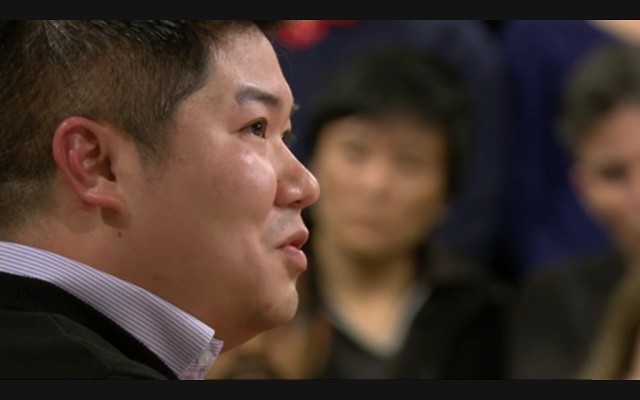My appearance with my partner Nam on last night’s SBS Insight episode about marriage equality was one of the most intense experiences of my life. To speak so publicly about something so personal was harder than I had envisaged. I thought I was strong enough to bear the brunt of bigotry, but the day after the program was filmed I broke down. For the first time, I felt the full force of internalised homophobia and public heterosexism.
Gay, lesbian, bisexual, transgender and intersex sisters and brothers were not born thinking of themselves as activists. They were born, like all fellow human sisters and brothers, seeking to love and to be loved. Last night I experienced my sexual orientation as a gift to be shared, but also as a curse.
My experience of those in the audience who opposed marriage equality was one of homophobia. Their entrenched position on acceptable identity and behaviour, even to the extent of wanting to criminalise gays having families, is the kind of heteronormativity that LGBTI people experience as prejudice, and is very painful. The notion that people fall strictly into distinct and complementary roles based on gender is the root of heterosexism which may be defined as a prejudice against any non-heterosexual form of behaviour, identity, relationship or community.
When Nam broke down during the program, it shocked me and I didn’t know how to react. I wanted to hug and kiss him but I was afraid. I felt vulnerable and frightened for him. The next morning, Nam looked weary in more than a physical sense, but he seemed to hold it together. I felt partly responsible for his distress.
Despite the kindness of those from the television program team, my tummy was churning. I drew strength from having Nam there with me, but apart from that the only way I could convince myself not to run from the stage was to envision those people sitting in the audience not as strangers, but as my fellow family members and friends. Some love us, and some don’t.
There were moments of grace and kindness during the forum, but also many wounding moments. What hurt and frightened me most was not the unkind or even ignorant responses and questions from some members of the audience, but the fact that they seemed to not want to hear us: they talked at me, past me, but never with me. We were merely an ‘issue’. I felt objectified as a piece of conversation. This hurt. I was transported back to the frightened 16-year-old boy at school, at church or at home who felt diminished and dehumanised.
After the program, many kind souls came to us and embraced us, told us that they have heard us and understand why marriage equality was so important to so many peoples and their families. While passing by the reception on the way back to the car, there was a clique of people, the same ones who had said those rather diminishing things during the forum. One of them stretched out a hand to shake mine and said ‘Nothing personal, and no offence.’
That shook me to my core. It felt like the kiss of betrayal. To me, those sentiments are the very seeds of discrimination. Words and thoughts that objectify people as ‘issues’ have proven in the past to lead to very cruel actions done to already marginalised people. That is how dehumanising heterosexism done in a seemingly ‘benign’ way becomes a weapon that destroys the lives and families of many here and around the world.
Some questions came to mind. Do we see a bird with wings and tell it not to fly? Do we trim off the flower of a tree that is meant to fruit, simply because the flower does not bloom as and where we see fit? What would the world look like if it were a garden like that? These questions go to the heart of heterosexism. They are questions about how we love one another and build a just and flourishing society, safe and inclusive of all.
Ben is an active member of his Catholic parish. He has worked in the area of cross-cultural development, human rights and international aid. Full name supplied. Visit his blog
Author: Ben
Publication: Eureka Street
Date: 13 August 2013

